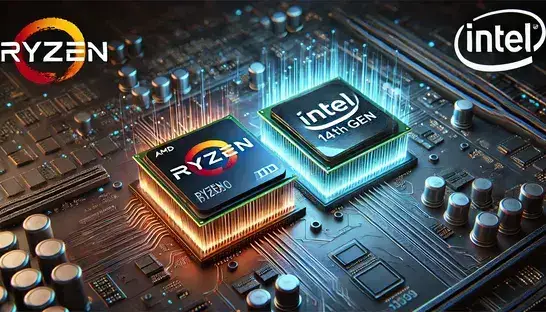In the ever-evolving landscape of technology, the rivalry between AMD and Intel remains one of the most talked-about debates in the computing world. As we step into 2025, both companies continue to push the boundaries of innovation, releasing cutting-edge processors that cater to gamers, professionals, and casual users alike. This article delves deep into the AMD vs. Intel battle, helping you decide which processor is the right choice for your needs.
The Current Market Landscape
AMD: Rising Star of the Last Decade
Advanced Micro Devices (AMD) has gained significant traction over the past few years, primarily due to its Ryzen series. AMD processors are known for their affordability, multi-core performance, and energy efficiency. The company’s adoption of the 5nm Zen 4 architecture has made their chips more powerful and efficient, cementing their place as a go-to option for gamers and professionals.
In 2025, AMD’s Ryzen 8000 series dominates the market with features like:
- Enhanced AI Acceleration: Seamless integration for AI-driven tasks.
- DDR5 and PCIe 5.0 Support: Ensuring compatibility with the latest technology.
- Exceptional Multithreading: Perfect for multitasking and rendering applications.
Intel: The Legacy Brand
Intel, a pioneer in the semiconductor industry, remains a strong competitor. The company’s 14th Gen Meteor Lake processors have introduced innovations like:
- Intel 4 Process Technology: Higher performance with lower power consumption.
- Integrated AI Engines: Designed for tasks like image processing and real-time translations.
- Hybrid Architecture: A mix of performance and efficiency cores for optimized workloads.
Despite fierce competition from AMD, Intel continues to lead in single-core performance, making it a favorite for gamers and users with heavy single-threaded applications.
Performance Comparison
Gaming Performance
For gamers, single-core performance and clock speeds are critical. Intel has traditionally held an edge in this area, and in 2025, the gap has narrowed but still exists. Intel’s 14th Gen chips offer:
- High Boost Clock Speeds: Ideal for AAA gaming titles.
- Better Compatibility: Optimized performance for most games.
AMD, on the other hand, shines with:
- Multi-Core Utilization: Beneficial for modern games that utilize more cores.
- Cost Efficiency: Providing similar performance at a lower price point.
Productivity and Multitasking
When it comes to productivity, AMD’s higher core counts give it a distinct advantage. Tasks like video editing, 3D rendering, and software development benefit from AMD’s multithreading capabilities. For instance:
- AMD’s Ryzen 9 8950X offers 16 cores and 32 threads, outperforming Intel’s closest competitor.
- Intel’s hybrid architecture balances efficiency and performance but falls short in heavily multithreaded scenarios.
Energy Efficiency
With rising energy costs and environmental concerns, power efficiency has become a critical factor. AMD’s 5nm architecture outshines Intel’s 7nm process in terms of energy efficiency, offering:
- Lower TDP (Thermal Design Power).
- Reduced heat output, which is ideal for compact builds.
Pricing and Value
AMD
AMD’s processors are known for their competitive pricing. In 2025, the Ryzen 7000 and 8000 series continue to offer excellent value, especially for budget-conscious users. Features like bundled coolers and overclocking support make AMD a cost-effective choice.
Intel
Intel’s processors are typically priced higher, reflecting their strong brand value and leading-edge single-core performance. However, the additional cost is often justified for users seeking the best gaming experience or specific workloads optimized for Intel.
Future-Proofing
When investing in a processor, future-proofing is a key consideration. AMD’s commitment to socket AM5 ensures compatibility with upcoming processors, offering better upgrade potential. Intel’s frequent socket changes, on the other hand, may require users to purchase a new motherboard with each major upgrade.
Which Should You Choose?
For Gamers:
- Intel: Best for high-end gaming due to superior single-core performance and game optimization.
- AMD: Ideal for gamers on a budget or those who play games optimized for multi-core performance.
For Professionals:
- AMD: Dominates in productivity tasks, offering higher core counts and better value for rendering, editing, and development.
- Intel: Suitable for professionals who prioritize specific software optimized for Intel processors.
For General Users:
- Both AMD and Intel offer excellent processors for everyday tasks. Your choice should depend on your budget and future upgrade plans.
Final Verdict
In 2025, the AMD vs. Intel battle boils down to individual needs. AMD excels in multitasking, energy efficiency, and value, making it the top choice for professionals and budget-conscious users. Intel, with its unmatched single-core performance and gaming optimization, remains the king for high-end gaming and specific workloads.
Ultimately, both brands are delivering exceptional processors that cater to different audiences. Whether you choose AMD or Intel, you’re investing in cutting-edge technology that pushes the limits of performance and innovation.











1 thought on “AMD vs Intel: Which Processor Reigns Supreme in 2025?”